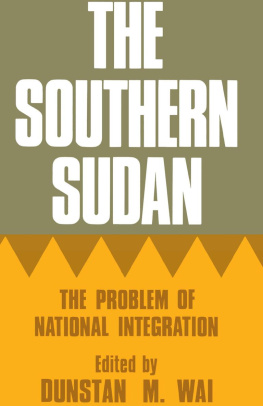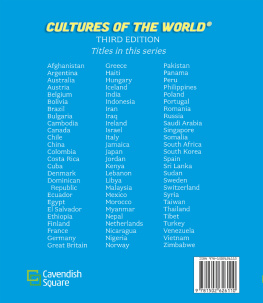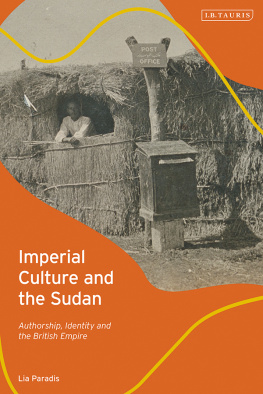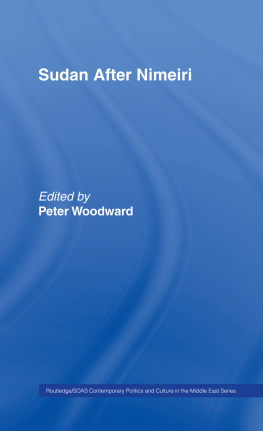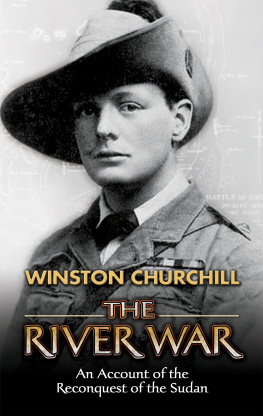Copyright Peter Pigott, 2009
All rights reserved. No part of this publication may be reproduced, stored in a retrieval system, or transmitted in any form or by any means, electronic, mechanical, photocopying, recording, or otherwise (except for brief passages for purposes of review) without the prior permission of Dundurn Press. Permission to photocopy should be requested from Access Copyright.
Editor: Michael Carroll
Design: Erin Mallory
Printer: Friesens
Library and Archives Canada Cataloguing in Publication
Pigott, Peter
Canada in Sudan : war without borders / Peter Pigott.
Includes bibliographical references and index.
ISBN 978-1-55002-849-2
1. Sudan--History. 2. Canada--Foreign relations--Sudan.
3. Sudan--Foreign relations--Canada. I. Title.
DT156.4.P54 2008 962.4 C2008-904874-1
1 2 3 4 5 13 12 11 10 09
We acknowledge the support of the Canada Council for the Arts and the Ontario Arts Council for our publishing program. We also acknowledge the financial support of the Government of Canada through the Book Publishing Industry Development Program and The Association for the Export of Canadian Books, and the Government of Ontario through the Ontario Book Publishers Tax Credit program, and the Ontario Media Development Corporation.
Care has been taken to trace the ownership of copyright material used in this book. The author and the publisher welcome any information enabling them to rectify any references or credits in subsequent editions.
J. Kirk Howard, President
Printed and bound in Canada.
www.dundurn.com
Dundurn Press
3 Church Street, Suite 500
Toronto, Ontario, Canada
M5E 1M2
Gazelle Book Services Limited
White Cross Mills
High Town, Lancaster, England
LA1 4XS
Dundurn Press
2250 Military Road
Tonawanda, NY
U.S.A. 14150
For Marion, who was caught by the JanjaweedACKNOWLEDGEMENTS
The problems in the Sudan are so complex and detailed that it would take several books to describe and even then would likely fail to do the job, warned Major Sandi Banerjee, deputy commander of the Canadian Task Force, Khartoum. The tribal factions as well as the religious and cultural strife all create additional layers that act in a logarithmic manner nothing is simple in Africa.
A lot of people were surprised by the subject. Sudan? I am known as an aviation author, and in the book business, when you are successful in a niche topic, the smart thing to do is to write the same sort of book once a year for the remainder of your life. I knew little of the country, its people, or its history. The sum total of my knowledge was from the 1966 movie Khartoum and of a boyhood reading of A.E.W. Masons novel The Four Feathers. Sudan evoked Martini-Henry rifles, proud desert warriors, and the soul-stirring public school sentiments from Sir Henry Newbolts poem Vitai Lampada:
The sand in the desert is sodden red,
Red with the wreck of the square that broke;
The Gatlings jammed and the Colonel dead,
And the regiment blind with dust and smoke.
Later on there was Roy MacLarens Canadians on the Nile, 18821898: Being the Adventures of the Voyageurs on the Khartoum Relief Expedition and Other Exploits, and when working in Foreign Affairs, I made sure I got on the distribution list for Nick Coghlans emails from Khartoum. Like everyone else, I followed the fortunes of the Canadian and Sudanese attachs being expelled and of the British schoolteacher arrested for insulting Islam after she allowed her seven-year-old pupils to name the class teddy bear Muhammad. And like everyone else, I am outraged at what is taking place in Darfur, the first genocide of the twenty-first century. How can one understand a government that is so contemptuous of the International Criminal Court that not only does it refuse to surrender an individual for crimes against humanity but makes Ahmed Haroun the minister for humanitarian affairs? There is something Orwellian about that.
John Bul Daus God Grew Tired of Us: A Memoir affected me deeply, but then so did Jeff Daviss article in Embassy magazine (March 5, 2008). Headlined Diplomat Doesnt Know the Meaning of Genocide, the piece was about Robert Aguek, the newly appointed first secretary of Sudans embassy in Ottawa. Aguek had replaced Mwada Omar, the Sudanese diplomat expelled the previous summer. When interviewed, the first secretary said that he wasnt very familiar with the situation in Darfur. I know there is a war in Darfur and that the government is fighting the rebels in Darfur, he commented. But I cannot tell you that the Government of Sudan [GOS] is killing the people in Darfur, because I didnt see. I did not see that. And when asked if genocide was occurring there, Aguek said he didnt know the meaning of the word. Perhaps Sir Henry Wotton was right: a diplomat is an honest man sent aboard to lie for his country. Canada in Sudan: War Without Borders attempts to bridge the gap between the romance and the tragedy of that country.
Knowing so little of Sudan and nothing of the Canadians there, I relied on many who did: archaeologists, humanitarian workers, members of the Canadian Forces, a former prime minister of Canada, and ordinary Canadians such as Waterloo Police Sergeant Debbie Bodkin, all of whom were so moved by the plight of the Sudanese that they gave up time with their own families and lucrative professions to devote their lives to them.
While many people helped in their own way, pride of place goes to three. A former Foreign Service officer, Roy MacLaren was a Liberal Member of Parliament and was a federal minister in the governments of John Turner (minister of national revenue) and Jean Chrtien (minister of international trade), capping off his career as High Commissioner for Canada to the United Kingdom of Great Britain and Northern Ireland. Between stints of public office, he was president of Ogilvy & Mather Canada and president and publisher of CB Media Ltd. MacLarens literary output has been equally prodigious. Besides Canadians on the Nile, he has published a number of other books, including Canadians in Russia, 19181919 and Canadians Behind Enemy Lines, 19391945.
Halifax lawyer Peter Dalglish went to Africa to rescue destitute children, but by his own admission they rescued him. An 11-year-old thief breaking into his Land Rover showed him what he was to do for the remainder of his life. Dalglish collected the abandoned children from the alleys and dumpsters of Khartoum to start a bicycle courier business run entirely by them. He championed their cause against police and government and international agencies, returning to Canada to begin Street Kids International, which in 2008 celebrated its twentieth anniversary working with two million kids in more than 60 countries. Recipient of the Vanier Award from 1994 to 1997, Dalglish was the first director of Youth Service Canada.


